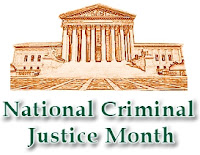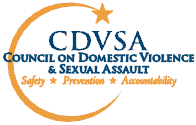 |
| Dr. Jane Palmer, American University |
We welcome as our first "guest blogger,"
Jane Palmer, M.S.W., Ph.D., with American University in Washington D.C. She is a researcher in the areas of gender-based violence and vicarious trauma.
Her post today focuses on factors that put researchers at risk for vicarious trauma, how researchers can help themselves, and how supervisors can support research staff. This post is based on a presentation Dr. Palmer gave in June 2014 at a roundtable at UAA on vicarious trauma among researchers.
Vicarious Trauma Among Researchers
Since I became a researcher in the field of gender-based violence, I have become concerned with the issue of vicarious trauma among researchers. My earlier professional experience as a counseling intern at a center for children who have been sexually abused was my first introduction to this concept. Vicarious trauma is experienced when working in a trauma-related field begins to negatively impact someone’s personal life. At my internship placement, I learned that self-care is critical to prevent vicarious trauma and its little sisters: compassion fatigue and burnout. Vicarious trauma is a well-researched area in the field of Psychology – in the context of therapists – but there is limited research on this issue among researchers. Of note, in the field of sexual violence, are
Dr. Rebecca Campbell’s (2002) book
Emotionally involved: The impact of researching rape and
a recent article in the peer-reviewed journal
Violence Against Women by Dr. Jan Coles and her colleagues. Much of the information below was gleaned from these two sources.
Compared to therapists, Coles et al. (2014) assert that conducting research on trauma-related topics may actually put researchers at higher risk of vicarious trauma because they are not in a helping role. To research and analyze, but not be able to offer assistance can tip the scale. Therefore, this blog post will focus on the factors that put individual researchers at risk for developing vicarious trauma and what supervisors can do the support their research staff before and during trauma-related research projects.
What Factors Are Associated with One’s Risk of Experiencing Vicarious Trauma?
There are several possible contributors to a person’s level of vicarious trauma.
- The researcher’s personal history of trauma, or past exposure to traumatic events. This could be a risk or protective factor. Individuals with little to no experience with trauma could be profoundly affected by what they learn in the course of the research. Alternatively, someone with a history of trauma may have better preparation to hear the stories. However, this will depend on where the individual is in his or her healing process, as some content can be triggering for survivors.
- The researcher’s coping and self-care strategies. The level of impact depends on the extent to which a researcher engages in healthy self-care or coping strategies. To evaluate your level of self-care, the University of Buffalo School of Social Work offers a great self-assessment. For some excellent self-care tips, check out this article from the Huffington Post.
- The researcher’s current life circumstances. No matter one’s past history with trauma, current coping and self-care strategies, a researcher’s current life circumstances can affect how she or he is able to cope with the stories she or he hears. Before embarking on a trauma-related research project, evaluate if you have the “space” in your life for it. If you feel like you’re life is currently trying or chaotic, now may not be the right time for this particular project.
- The researcher’s current support systems. It is crucial that researchers have someone to debrief with, whether it is a professional colleague, a friend or loved one. Support systems should be those that can actually be supportive of you (that is, they are interested in the topic and are ok with hearing the stories or supporting you how you need to be supported). For research projects with confidentiality agreements, the debriefing should occur with other project members. Still, your loved ones can support you even without knowing the content of what you are studying. Researchers should evaluate the extent to which their current support systems are a positive force in their life and consider avoiding the toxic or negative people in their lives.
- The researcher’s current level of self-awareness. Do you know your limits? Do you listen to the little voice in your head or do you tune it out? Developing self-awareness will help you, your relationships and your daily life immensely.
How can I support my research team?
At the organizational level, research supervisors can prevent or mitigate vicarious trauma by preparing research assistants (RAs) about the issues they will hear or read about throughout the project.
- This preparation should occur early in the process – as early as the hiring phase – so that the right team is selected to do this difficult research.
- Supervisors should develop policies and procedures related to caring for the research assistants (such as a maximum number of interviews per day or a protocol if an RA experiences negative impacts while conducting the research).
- RAs should receive regular, scheduled and supportive supervision and have plenty of opportunity to debrief with one another (especially in cases where confidentiality agreements preclude them from discussing their work with others).
- If debriefing is not possible (because you are not working on a team or the team has shifts that make meeting impossible), I highly recommend utilizing journaling in order to do a “data dump” of stories and their impact before going home or to decompress at the end of a shift. If possible, supervisors should assign RAs some “mindless” tasks in addition to the tough stuff so they can get a mental and emotional break, as needed.
- Finally, RAs and supervisors should actively practice and promote self-care that nourishes the body, mind and spirit. Ignoring these tips may affect the validity of your research findings (Wray, Markovic & Manderson, 2007).
How Do I Know If I Have Vicarious Trauma?
Vicarious trauma is the most severe impact of conducting research about violence. Researchers can also experience lower levels of impact when they work on trauma-related research projects (such as compassion fatigue or burnout). Any research project can make a researcher feel stressed – a state that is common among, well, basically everyone – and a state that can be managed on a daily basis. Burnout, on the other hand, is a more severe form of stress that includes symptoms such as increased apathy, irritability, pessimism, cynicism, or fatigue. If burnout goes untreated, a researcher can experience compassion fatigue (also called secondary traumatic stress). People at this stage feel emotionally or physically depleted and have symptoms similar to Post-Traumatic Stress Disorder, such as hyper-vigilance, avoidance or numbing or have nightmares about the events they have heard or read about but not experienced. Finally, the most severe impact of empathic engagement with traumatic material is vicarious trauma, which is associated with changes in one’s world view (related to safety, trust, intimacy, and control), persistent physical and/or psychological symptoms (such as persistent hyperarousal, cynicism, guilt or loss of idealism) and behaviors that affect one’s relationships (such as withdrawal, increased conflict or disconnection from loved ones).
Conclusion
Conducting research about violence is not for everyone. Both researchers and supervisors must reflect on whether, given their current circumstances and past history, they have the internal and external support to embark on a project that involves traumatic material. If your gut is telling you that now is not the time, then take the time you need to address current stressful life circumstances or your own history or trauma before embarking on a research project that involves other’s stories of pain and trauma. Oh yeah, and stop watching C.S.I. and Criminal Minds, you’ll thank me later.
About the author
 |
Dr. Palmer in front of
Northwestern Glacier in
June 2014. |
Jane Palmer is a professorial lecturer at American University’s School of Public Affairs in Washington DC and the Director of the Community-Based Research Scholars program. She received her Ph.D. in Justice, Law & Society from American University and her M.S.W. from the Jane Addams College of Social Work at the University of Illinois-Chicago. Her research focuses on responses to gender-based violence (including bystander intervention, help-seeking behaviors and public policy). Her self-care strategies include yoga, meditation, hiking and attempting to read young adult fiction at the same rate as her nieces.
References
Campbell, R. (2002).
Emotionally involved: The impact of researching rape. London: Routledge.
Coles, J., Astbury, J., Dartnall, E. & Limjerwala, S. (2014). "A qualitative exploration of researcher trauma and researchers’ responses to investigating sexual violence."
Violence Against Women, 20, 95-117.
Wray, N., Markovic, M. & Manderson, L. (2007). "The impact of data triangulation and intensive-research practices on the researcher and qualitative research process."
Qualitative Health Research, 17, p.1392.
 Prof. Jason Brandeis, Legal Studies faculty in the Justice Center, was interviewed for a recent article in the Alaska Dispatch News about marijuana use and employment. Because of the conflict between federal and state law regarding marijuana use, and because some Alaska employers receive federal funds which potentially brings them under the terms of the 1988 Drug-Free Workplace Act, Prof. Brandeis commented, " I imagine there will be some court cases that come out of this."
Prof. Jason Brandeis, Legal Studies faculty in the Justice Center, was interviewed for a recent article in the Alaska Dispatch News about marijuana use and employment. Because of the conflict between federal and state law regarding marijuana use, and because some Alaska employers receive federal funds which potentially brings them under the terms of the 1988 Drug-Free Workplace Act, Prof. Brandeis commented, " I imagine there will be some court cases that come out of this."




























